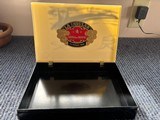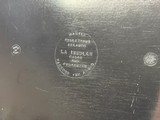 |
 |
 |

Colonel Fields’ Cigar Box: A Unique WWII Memorabilia Item
Guns International #: 103203374 Seller's Inventory #:
Category: Collectibles - WWII -
Seller's Information
When emailing or calling sellers direct, please mention that you saw their listing on GunsInternational.com
Seller: James Carr's Antique Guns and Collectibles
Member Since: 3/8/15
First Name: James
Last Name: Carr
State: Colorado
Zip: 81403
Country: United States
Phone: (703) 431-3159
Premium Seller
Number of Active Listings: 28
Total Number of Listings: 143
Seller: Private Seller
Return Policy: 3 day inspection and return policy on used guns.
Payment Types Accepted: Zelle, money orders or checks with cleared funds
Description:
The item for sale is a bake lite cigar box produced in the late 1930’s for packaging of a limited edition of cigars then being sold by the La Insular Cigar and Cigarette Factory, in the Philippines. It was part of a series of such boxes which were hand painted to show traditional scenes of Philippine life. The box is original, intact and in excellent condition. Approximate dimensions: 8 1/2x 6 1/2 x2 1/2"
Here is the story of this box:
The La Insular Cigar and Cigarette Factory was the oldest tobacco company in the Philippines, being established by native entrepreneurs in the 1880’s following the abolition of the Spanish tobacco monopoly. It was headquartered in the Biondo business district of Manilla, along the Plaza de Calderon de la Barca, in a huge and beautiful three story traditional Spanish style building, designed by the noted architect, Juan Jose Arizmendi.
In the 1930’s, Manila was known as a prosperous business center, a center for beautiful architecture such as the La Insular building, and for the gentility of its upper class. It was referred to as the “Paris of Asia” and “The Most Beautiful City in the Far East”. Unfortunately, this condition and status would soon be destroyed by war.
In the late 1930’s, wars were alreadyy raging in both Asia and Europe. The majority of citizens in the United States believed the country could and should isolate itself from involvement in such matters abroad. However, in 1939, as the inevitability of our participation became ever more obvious, President Roosevelt and Congress called up military reserves, reimplemented the draft, and began serious preparations for war abroad. Colonel Albert Fields, a medical doctor who had served in WWI was one of the call ups from the Army reserves. He was assigned a medical post in Manila and travelled there with his wife and daughter. He found a comfortable residence for his family. He then began to work with other military doctors to create, basically from scratch, a modern military medical system which could deal with the war anticipated in the Pacific. These doctors worked tirelessly to organize, construct facilities, train native personnel, assemble supplies and otherwise create a system of medical care not previously existing in the Philippines. But less than a year later, as the political situation worsened in the Pacific, he felt the time of war in the Philippines was drawing close and sent his family back to the States and away from danger. When he did so he emptied his favorite cigars from this cigar box and gave it to his wife to carry her jewels on her person as she traveled, telling her he would rejoin her shortly. She reached the States with their daughter and they were safe. But Colonel Fields was not to be so fortunate. Following the bombing of Pear Harbor, the Japanese promptly invaded the Philippines, and the American and Filipino forces could only fight a delaying action in the face of overwhelming numbers. Colonel Felds was part of the defense of Manila, the retreat, and the surrender at Corregidor. After surviving the Bataan Death March, he was placed in the infamous Cabanatuan POW camp on Luzon where he remained for the next 3 years. On January 30, 1945, a mixed force of US Army Rangers, and Filipino forces conducted a daring night time raid (thereafter known in book and movie fame as “The Great Raid”) in which over 500 Japanese soldiers were killed and all allied prisoners were liberated. Several months later Colonel Fields was able to rejoin his family in the States, his military duties finally at an end. While there had been no information on his status until shortly before he was repatriated, his wife never gave up her belief in his survival and this box was the symbol of his commitment to rejoin her when they separated.
As to the fate of the La Insular Cigar and Cigarette Factory:
During 1941, the Japanese extensively bombed the city of Manila before capturing it. In 1944, the Japanese fanatically defended the city from recapture by the allies causing further mass destruction. By the end of the war, the beautiful city of Manila was no more, only a physical wasteland. Included was the complete destruction of the La Insular Cigar and Cigarette Factory headquarters building, along with its business operations. The company never resumed operations, its headquarters building was never rebuilt and Manila never resumed its status as the premier city of the Far East.
The listed price of $125 includes shipping to a purchaser in the continental United States. Payment is by Zelle or USPS money order.
Price: $125.00